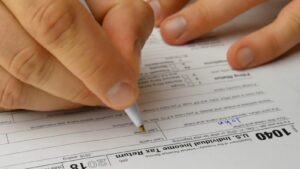What Are Quarterly Taxes?
 Quarterly taxes (or estimated taxes) are how self-employed individuals have to pay their taxes to the IRS throughout the year if your income exceeds a certain amount. So depending on how much self-employed income you earn, you could have not one, but four “Tax Days” during the year.
Quarterly taxes (or estimated taxes) are how self-employed individuals have to pay their taxes to the IRS throughout the year if your income exceeds a certain amount. So depending on how much self-employed income you earn, you could have not one, but four “Tax Days” during the year.
These four tax payments, made every three months, are meant to cover Social Security, Medicare and your income tax. Here are the two kinds of taxes to know about:
- Self-employment tax: This tax is generally 15.3% of your self-employed income, and it rolls your share of Medicare and Social Security taxes into one tax. When you’re a salaried employee, your employer will split the cost of those taxes with you. But when you’re in business for yourself, you’re responsible for the whole thing.
- Income tax: You’ll pay taxes on your income at your income tax rate, just like everyone else.
That’s why we recommend you set aside around 25–30% of every paycheck for taxes if you’re self-employed. That way, you’re not blindsided by a huge tax bill when it’s time to pay up.
Who Pays Quarterly Taxes?
Freelancers, independent contractors and small-business owners who expect to owe at least$1,000 in taxes from their self-employed income all pay quarterly taxes. If you owe less than that, you can just pay your taxes on that income when you file your annual tax return.
If you’re not sure if you’ll need to pay quarterly taxes, you should reach out to a tax professional who can help you figure out which camp you fall into. If you wind up owing a significant amount and didn’t file quarterly, you may have to pay an underpayment penalty on top of the taxes you owe. So, don’t overlook this!
